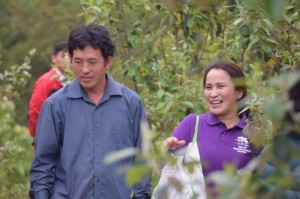By Mai Thanth Tu, originally posted at Agroforestry World Blog

Farmers’ participation in research will increase their ownership of results and motivation to change their agricultural system for long-term benefits, according to researchers in Viet Nam
Farmers working with scientists in three provinces in Northwest Viet Nam could see with their own eyes how a fodder-grass barrier could help to reduce soil erosion and the benefits of growing perennial crops, such as fruit trees.
‘We may have lower income for the first two years but in the long run, we will have much better income compared to maize, cassava and rice, especially when upland fertility is becoming poorer and poorer’, said Mr Giang Giong Vu, a H’mong farmer who is participating in a ‘son tra’ (Docynia indica) and fodder grasses trial established in collaboration with the World Agroforestry Centre, Australian Centre for International Agricultural Research, Forestry Science Centre Northwest Viet Nam and two research programs of the CGIAR: Forests, Trees and Agroforestry and Integrated Systems for the Humid Tropics.
The project, Agroforestry for Livelihoods of Smallholder Farmers in Northwest Vietnam (AFLI), aims at developing best-practice agroforestry systems in order to provide farmers with diverse sources of income while sustaining the environment in Yen Bai, Dien Bien and Son La provinces. Through a holistic approach, the project helps farmers not only with production but also with market access. After four years of implementation, AFLI has established 11 agroforestry trials and six farmer demonstration trials, covering nearly 50 hectares, with around 100 households involved.
In the AFLI project, farmers have been designing the trials of the different agroforestry systems along with the scientists. Five crops were prioritised that were to be included in the trials. The criteria for selecting the crops included ease of cultivation, market demand, high value at sale and opportunities for adding more value.
‘When farmers are involved in the crop selection process, they are happy to take care of their trial plot’, said Dr La Nguyen, AFLI project manager.
Farmers were also trained in establishing community nurseries to provide seedlings themselves because commercial tree seedlings were expensive. The researchers were impressed that two farmers in Dien Bien and Son La provinces—Mr Lo Van Ngoai and Mr Nguyen Lam—had volunteered their own land to build the nurseries, which demonstrated their motivation and long-term commitment. Each nursery was taken care of by 15 households and aimed to produce about 5000 seedlings for the group members.
The AFLI project mostly assists farmers to improve their knowledge and capacity. None of the farmers were paid for participating even though they contributed their labour to the nurseries and trial plots.
However, a challenge remains whether farmers have been informed enough so they can participate optimally. For example, researchers found that farmers lacked sufficient information about marketing, especially markets for new products being developed in the trials, such as macadamia and walnut. This was something that would be addressed together with the farmers, reinforcing the participatory approach for maximising benefits.











